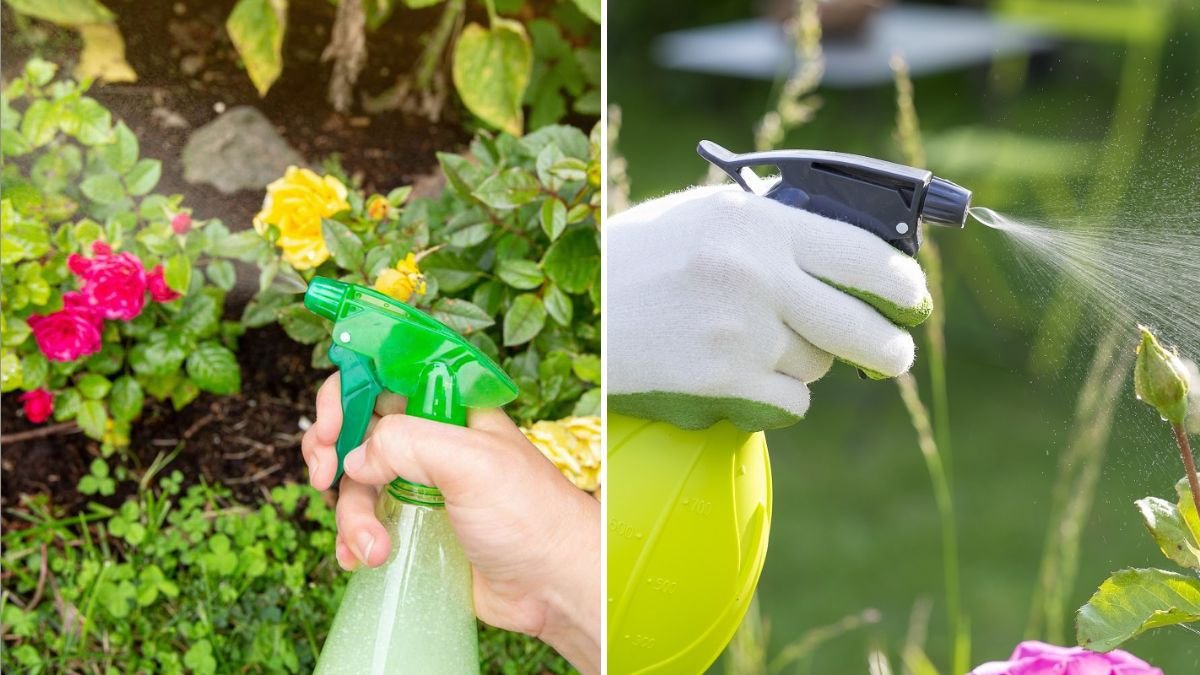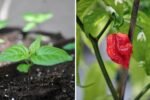Vinegar, a staple in kitchens worldwide, is increasingly being recognized as a powerful, eco-friendly tool for gardeners. From controlling weeds to deterring pests and even adjusting soil pH, vinegar is versatile, inexpensive, and non-toxic when used correctly. However, because of its acidity, improper use can harm plants, soil health, and beneficial insects. Learning how to use vinegar in the garden safely ensures you get the maximum benefits without unintended damage.
This comprehensive guide will explore the safe uses, methods, concentrations, and precautions when incorporating vinegar into your gardening routine.
Understanding Vinegar’s Role in Gardening
Vinegar’s main active component is acetic acid, which gives it its characteristic acidity. Depending on its concentration, vinegar can:
- Act as a natural herbicide: High-concentration vinegar can kill weeds, especially young, tender ones.
- Control pests: Vinegar can deter some insects and pests when used carefully.
- Adjust soil pH: Diluted vinegar can slightly acidify alkaline soil for acid-loving plants.
- Clean tools and containers: Vinegar is an effective natural cleaner that reduces disease spread.
Key Point: Vinegar is non-selective—it can harm any plant it touches. Always apply carefully and sparingly.
1. Using Vinegar as a Natural Weed Killer
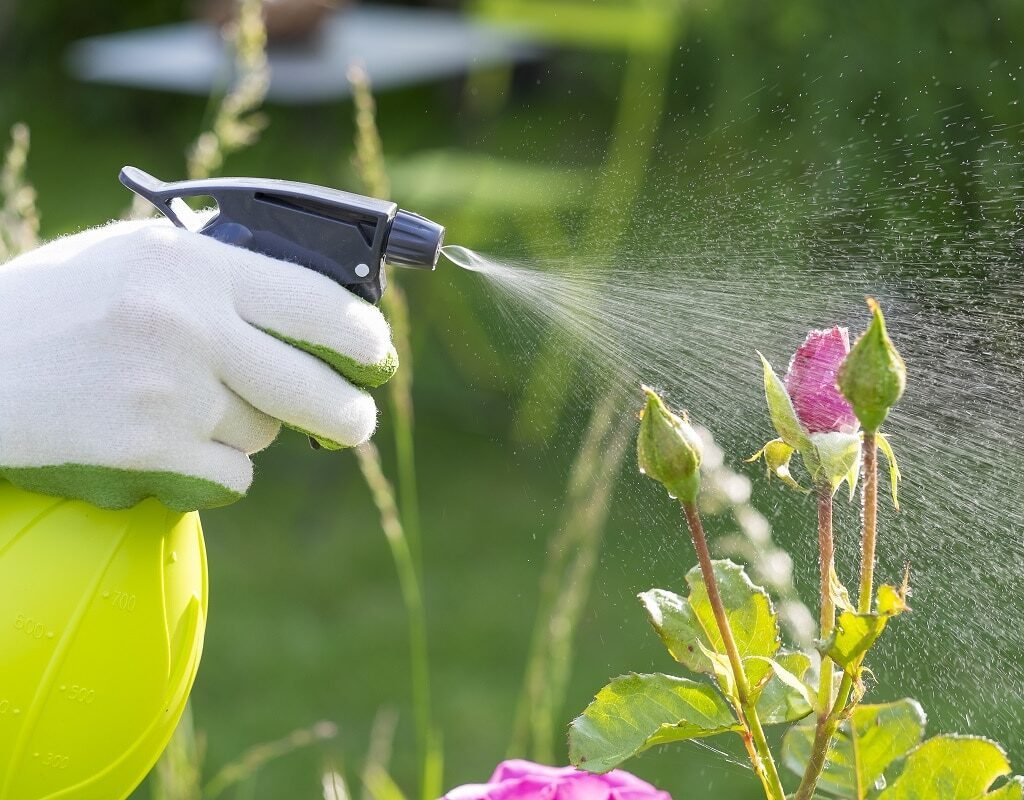
Vinegar is often used as a non-toxic alternative to chemical herbicides, particularly for small weeds or cracks in driveways and pathways.
How to Apply:
- Use household vinegar (5% acetic acid) for most weeds.
- For tougher weeds, horticultural vinegar (20% acetic acid) may be used, but handle with extreme care.
- Apply directly to the leaves using a spray bottle, preferably on a sunny, dry day.
- Avoid contact with desirable plants, as vinegar will damage them.
Tips:
- Young weeds are easier to control than mature, established ones.
- Multiple applications may be needed for stubborn weeds.
- Test on a small area first to observe effects.
Safety Note: Wear gloves and eye protection, especially with high-concentration vinegar, to prevent irritation.
2. Using Vinegar to Deter Pests
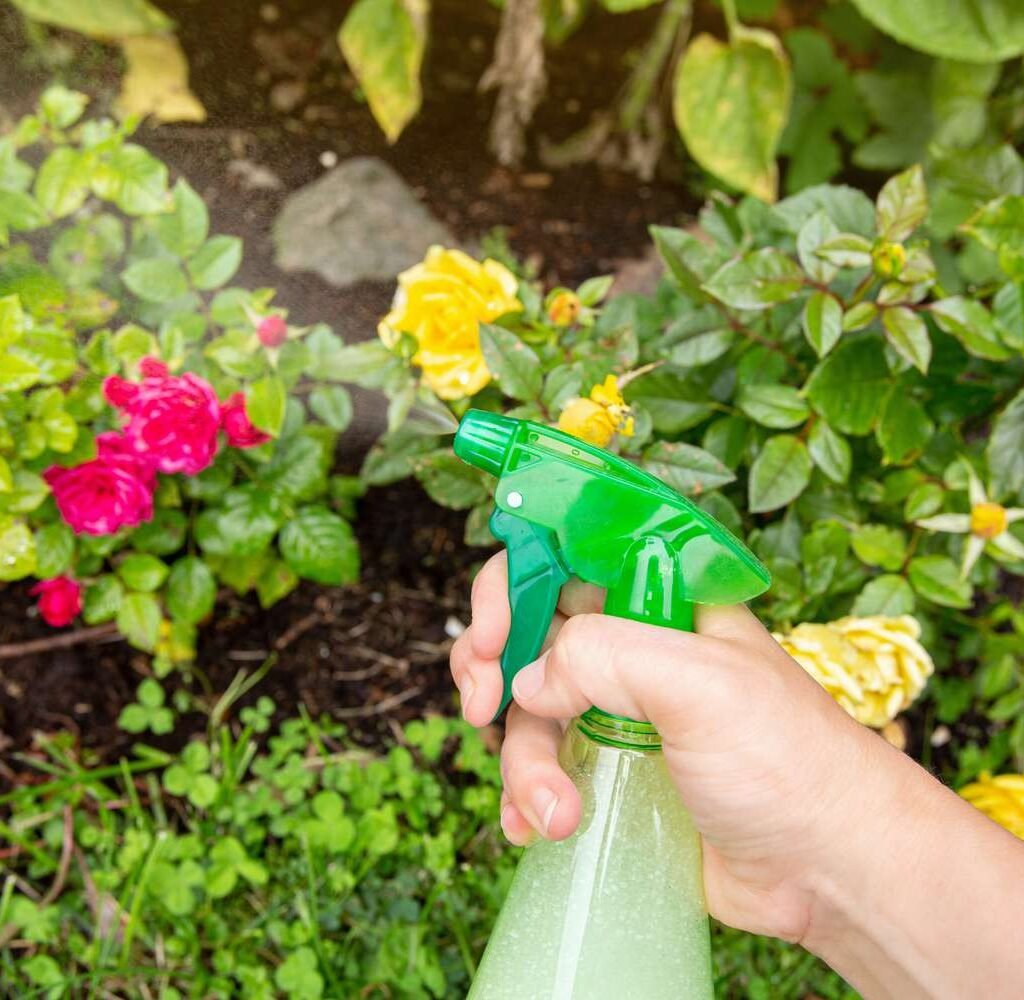
While vinegar is not a full-proof pesticide, it can help repel certain garden pests like ants, slugs, and fruit flies.
Applications:
- Ant Deterrent: Mix equal parts water and vinegar, and spray along ant trails or entry points.
- Slug Barrier: Lightly sprinkle vinegar around affected areas, but avoid pouring directly on soil near plants.
- Fruit Fly Trap: Combine vinegar with a few drops of dish soap in a small container to trap flies.
Tips:
- Vinegar works best as a deterrent, not a permanent solution.
- Avoid applying vinegar to beneficial insects or pollinators, as it may harm them.
3. Adjusting Soil pH with Vinegar
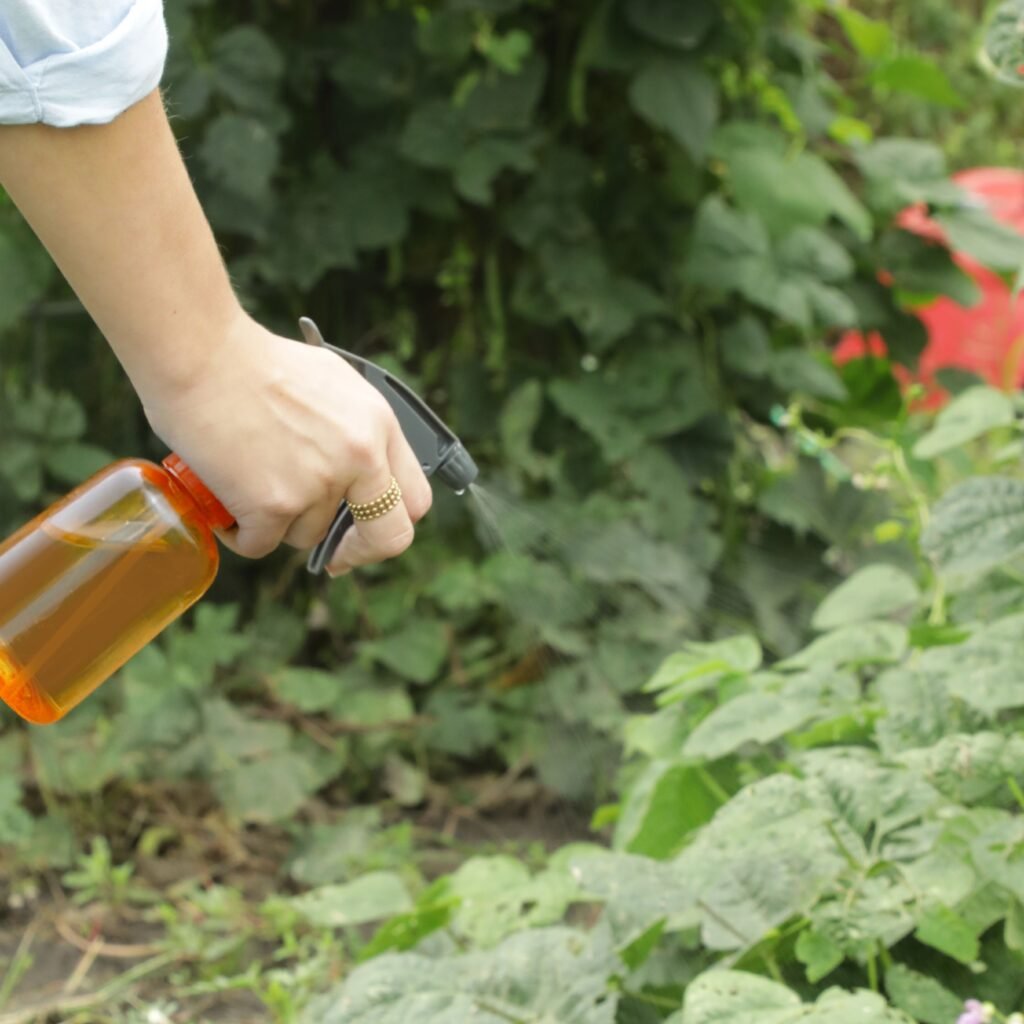
Vinegar can be used to slightly acidify alkaline soils, which is useful for acid-loving plants like blueberries, azaleas, and hydrangeas.
How to Apply:
- Dilute 1 tablespoon of vinegar in 1 gallon of water.
- Water the soil around the base of the plant; do not pour directly onto leaves.
- Use sparingly and only occasionally, as excessive use can disrupt soil microorganisms and harm plants.
Tips:
- Test soil pH before using vinegar to ensure it is necessary.
- Monitor plant health after application to avoid stress or damage.
4. Cleaning Garden Tools and Pots
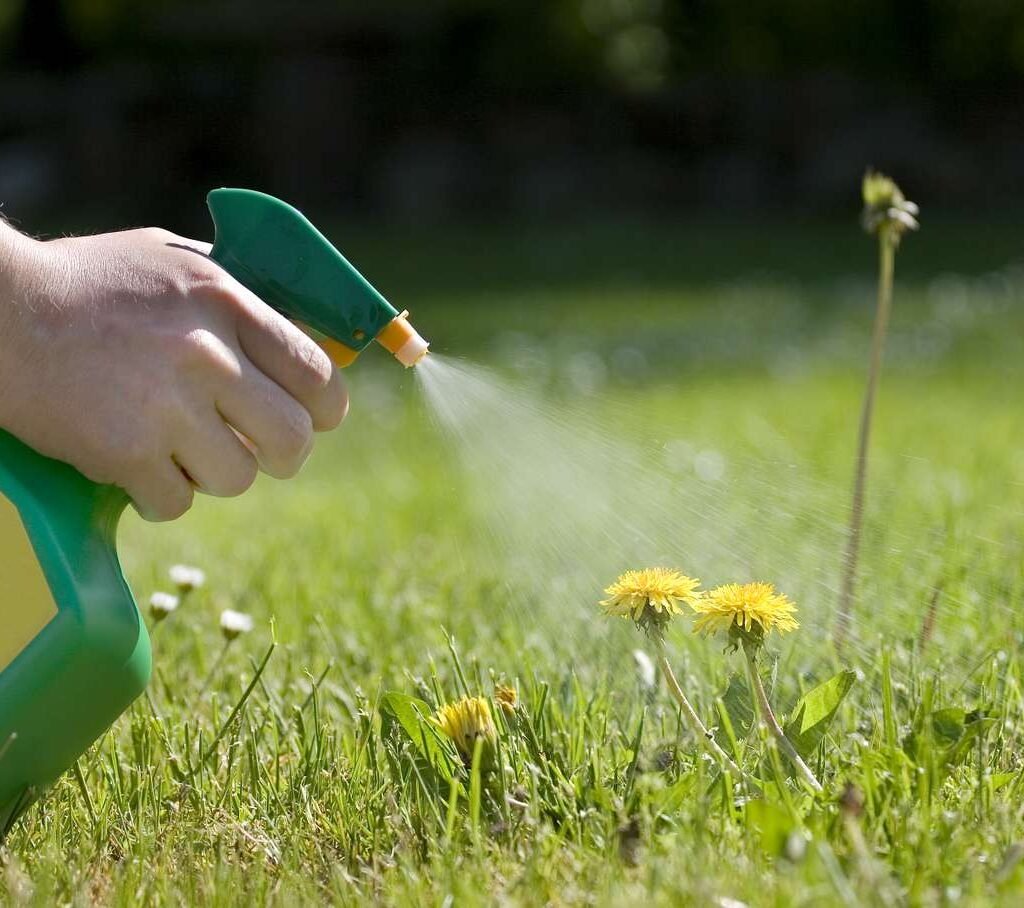
Vinegar is an effective natural cleaner that removes rust, algae, and dirt, reducing the risk of disease spread.
How to Clean Tools:
- Mix equal parts vinegar and water in a container.
- Soak rusty or dirty tools for 10–15 minutes.
- Scrub with a brush, rinse thoroughly, and dry.
How to Clean Pots:
- Wipe plastic, clay, or ceramic pots with vinegar to remove residue and algae.
- Rinse thoroughly to prevent acidity from harming new plants.
Tips:
- Regular cleaning prevents cross-contamination of pathogens between plants.
- Avoid prolonged soaking of metal tools to prevent corrosion.
5. Precautions for Safe Use
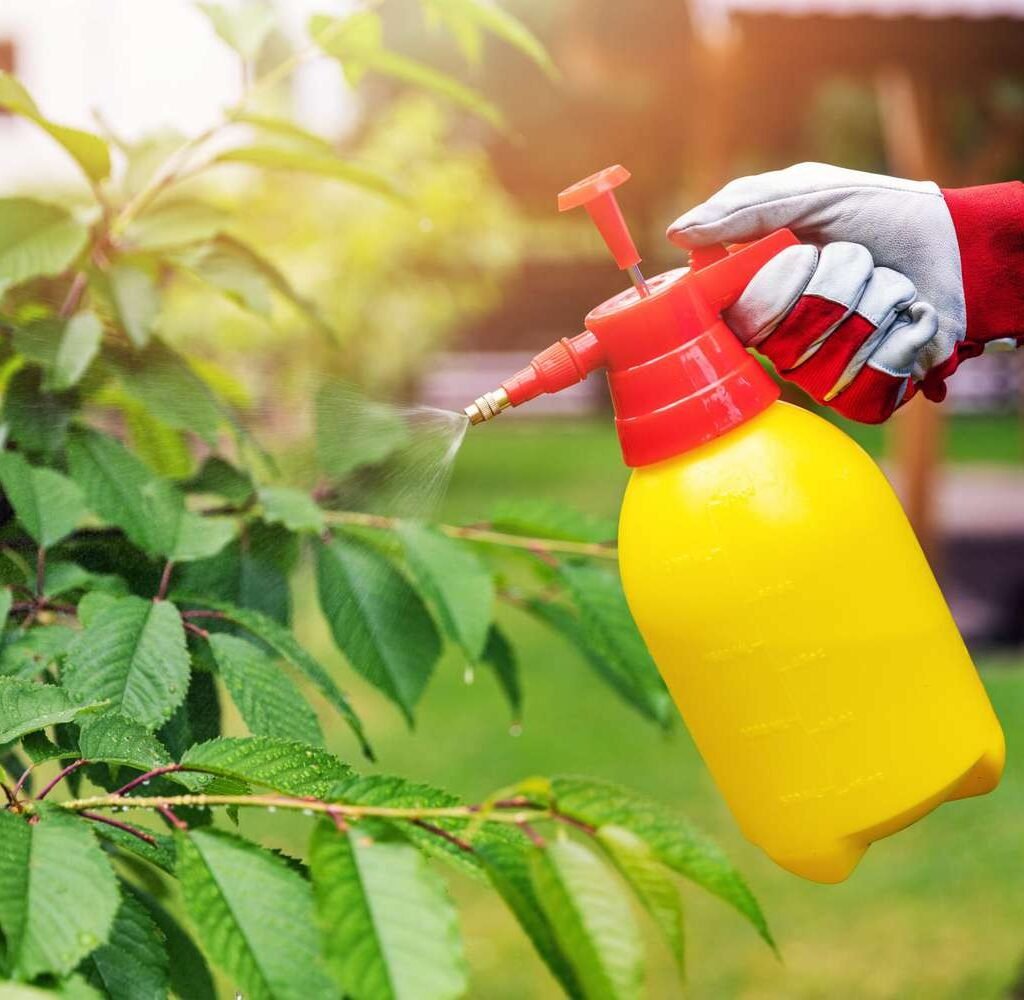
Vinegar is safe when used correctly, but its acidity can be harmful if misapplied. Follow these precautions:
- Avoid Direct Contact with Desirable Plants: Vinegar will damage leaves and stems on any plant.
- Use Dilutions: Household vinegar (5%) is usually safe for mild applications; avoid concentrated horticultural vinegar unless experienced.
- Protect Soil Life: Overuse can disrupt beneficial microorganisms in the soil.
- Wear Protective Gear: Gloves and eye protection are recommended when handling concentrated vinegar.
- Avoid Pollinators: Do not spray flowers visited by bees or butterflies, as vinegar can harm them.
6. Application Techniques for Maximum Safety
Spot Treatment
- Apply vinegar with a small spray bottle or brush to target only weeds or problem areas.
Soil Application
- Only use diluted vinegar (1 tablespoon per gallon of water) near acid-loving plants.
- Water thoroughly after application to prevent excessive acidity.
Container Cleaning
- Wipe down pots and tools; rinse thoroughly before reuse to prevent plant damage.
Tips:
- Avoid spraying in windy conditions to prevent drift onto desired plants.
- Apply on dry days for best results when using vinegar as a weed killer.
7. Vinegar Myths in Gardening
- “Vinegar will kill all weeds instantly.”
- It works best on small, young weeds; larger, established weeds may require multiple treatments.
- “Vinegar is safe for all plants.”
- Vinegar is non-selective; any plant it contacts may be damaged.
- “Vinegar permanently alters soil pH.”
- When used in small amounts, vinegar only temporarily affects soil pH. Excessive use can harm soil life.
Tip: Use vinegar as part of an integrated gardening approach rather than a standalone solution.
8. Complementary Uses in the Garden
- Seed Germination: Some gardeners soak seeds in diluted vinegar to reduce fungal growth, but only in very small concentrations.
- Cleaning Garden Furniture: Vinegar can remove mold and mildew from outdoor furniture safely.
- Weed Barrier Preparation: Apply diluted vinegar to areas before planting paths or borders to reduce weed growth.
9. Environmental and Cost Benefits
Using vinegar in the garden is:
- Eco-Friendly: Non-toxic alternative to chemical herbicides and pesticides.
- Affordable: Inexpensive and widely available.
- Versatile: Cleans, deters pests, and adjusts soil chemistry safely when used correctly.
Tip: Vinegar complements organic gardening practices by reducing reliance on synthetic chemicals.
10. Final Thoughts
Vinegar is a powerful, multi-purpose tool for gardeners who want natural, low-cost solutions. When used correctly, it can:
- Control weeds effectively
- Deter certain pests
- Slightly adjust soil pH for acid-loving plants
- Clean tools and pots safely
The key is dilution, precision, and timing. Overuse or improper application can harm desirable plants and beneficial soil organisms. By following these guidelines, you can integrate vinegar safely into your gardening routine, making your garden healthier, more productive, and environmentally friendly.
Incorporating vinegar into your gardening toolkit allows you to manage weeds and pests naturally while reducing chemical dependence. With careful application and respect for its potency, vinegar becomes an eco-friendly ally in cultivating a thriving garden.
